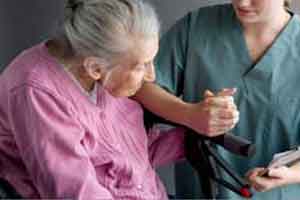- Home
- Editorial
- News
- Practice Guidelines
- Anesthesiology Guidelines
- Cancer Guidelines
- Cardiac Sciences Guidelines
- Critical Care Guidelines
- Dentistry Guidelines
- Dermatology Guidelines
- Diabetes and Endo Guidelines
- Diagnostics Guidelines
- ENT Guidelines
- Featured Practice Guidelines
- Gastroenterology Guidelines
- Geriatrics Guidelines
- Medicine Guidelines
- Nephrology Guidelines
- Neurosciences Guidelines
- Obs and Gynae Guidelines
- Ophthalmology Guidelines
- Orthopaedics Guidelines
- Paediatrics Guidelines
- Psychiatry Guidelines
- Pulmonology Guidelines
- Radiology Guidelines
- Surgery Guidelines
- Urology Guidelines
ASA's guidelines to reduce confusion after surgery in older patients

There are two major anesthesia-related surgery risks which are more common in older people namely Postoperative delirium & Postoperative cognitive dysfunction (POCD).There are chances of developing a medical condition that requires surgery or a procedure as the age advances. All such patients who are 65 and older undergoing surgery along with developing nausea, chills or muscle aches and itching are at increased risk for confusion or short-term memory loss.The measures to reduce confusion after surgery in older patients need to be taken to face this challenge.
During Patient Safety Awareness Week (March 11 – 17) ASA offers six tips for seniors to help limit confusion after surgery:
- Ask your physician to conduct a pre-surgery cognitive test — an assessment of your mental function. The physician can use the results as a baseline for comparison after surgery.
- Be sure your caregiver, a family member or friend stays or can visit with you as you recover, carefully observes your physical and mental activity after surgery and reports anything troubling to your physician.
- Check with your physician before taking medications after surgery that can affect your nervous systems, such as those for anxiety, seizures, muscle spasms or sleep aids.
- If you wear hearing aids or glasses, ask that they be made available as soon as possible after the procedure.
- Request a hospital room for recovery with a window if possible, so you can tell whether it’s day or night.
- If you will be staying overnight in the hospital, pack a family photo, a clock and a calendar, or other familiar objects from home, to help you readjust.
“The aging brain is more vulnerable to anesthesia and surgery, but there is research that provides guidance to decrease these risks,” said James D. Grant, M.D., M.B.A., FASA, president of the American Society of Anesthesiologists (ASA). “Older patients should talk with their physician anesthesiologist prior to surgery about their entire medical history and any memory problems they’ve had in the past, so an anesthesia plan can be developed that ensures their safety and reduces the chance of side effects or complications.”
Two anesthesia-related surgery risks more common in older people include:
Postoperative delirium – This is a temporary condition that causes the patient to be confused, disoriented, unaware of their surroundings, and have problems with memory and paying attention. It may not start until a few days after surgery, comes and goes, and usually disappears after about a week.
Postoperative cognitive dysfunction (POCD) – This is a less well understood but more serious condition that can lead to long-term memory loss and make it difficult to learn, concentrate and think. Because some of these problems are already common in elderly people and may be the sign of an underlying long-term cognitive decline, the only way to determine if a patient actually has POCD is to conduct a mental test before surgery.
Researchers in anesthesia care continue to study and learn more about these conditions and how to prevent or reduce the effects.
In 2016, ASA launched the Perioperative Brain Health Initiative which has engaged a multidisciplinary group to work with healthcare providers, payers and the public to create better access to care that minimizes the impact of pre-existing conditions that may impair mental thinking or intellectual abilities, and optimizes patients’ cognitive recovery and their experience before, during and after surgery for adults 65 and older.

Disclaimer: This site is primarily intended for healthcare professionals. Any content/information on this website does not replace the advice of medical and/or health professionals and should not be construed as medical/diagnostic advice/endorsement or prescription. Use of this site is subject to our terms of use, privacy policy, advertisement policy. © 2020 Minerva Medical Treatment Pvt Ltd